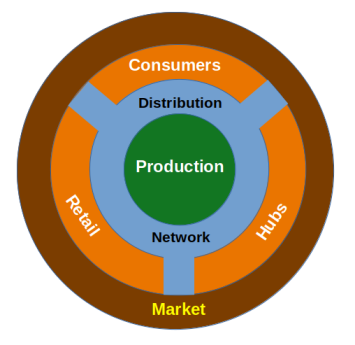Green Economy
06 Jan 2024 12:10
Driving down eCO2 emissions is a big challenge. Keeping them down is just as big a challenge. We need to established a local economy which has minimal carbon cost (zero or net zero) and one that protects and enhances the environment. A green economy is by definition one that delivers this, while also creating an equitable and sustainable economic environment where both nature and people can flourish.
There are many models on how to achieve a green economy and we will work with partners like the Exeter University Centre for Circular Economy. However, it is clear that controlling, directing and managing growth is central to creating a green economy. It is also necessary to create the right conditions and infrastructure:
Economic activity is the source of most eCO2 emissions and environmental damage. Whether as a producer of goods or services, or as a consumer, or both, much of our daily life is involved with participating in and enjoying economic activity.
It follows that to drive down emissions and to protect and enhance the environment we need to move to a greener economy. This needs to be done at scale to achieve the emission reductions and social and environmental benefits needed, and SHDC is in a strong position to catalyse these changes, to work with and alongside the many local initiatives that already exist, and to create the environment and infrastructure needed for a green economy to grow and flourish.

To give some context, the diagram is a simple schematic of the essential relationships in a local green economy that are addressed in these proposals. The following concentrates on the food sector, but the principles can be generalised, and the benefits would be felt across other sectors.
The headline parts of what needs to be done are:
- Local Production and Consumption;
- The Market Place, Convenience and Adoption;
- Efficient Distribution;
- Production Methods.
1 Local Production and Consumption
An important aspect of creating a more green economy is local production and consumption. Long supply chains result in uncontrollable (scope 3) emissions and also introduce costs which are then handed on to the consumer. Nearly 80% of the cost of an item in a supermarket is supply chain cost. Similarly, when purchasing an item in a supermarket 80% of that money leaves the area, in contrast to when purchased in a local shop, when 80% stays local.
By encouraging local production and consumption, and thereby shortening supply chains, we can:
- considerable reduce supply chain emissions, especially so called scope 3 emissions;
- reduce cost to consumers and make local produce competitive;
- increase well-being and social justice by making good food affordable;
- increase economic health by ensuring money stays local;
- provide economic certainty to local producers;
- encourage change in production methods;
- build local independence and resilience.
2 The Market, Convenience and Adoption
To encourage local production, there needs to be a vibrant local market for producers to sell into. To be successful, at the scale that is required, the market needs to compete on both cost and convenience with the established long supply chain operators. It needs to replicate the cost and convenience offered by the supermarkets and Amazon-like next-day deliveries. To do this two technical solutions are proposed:
- The establishment of an e-commerce platform that provides the facility to buy from multiple vendors (like Amazon), to pay once and to get delivery within a few days.
- The creation of a deliver network (see next section) to facilitate pick up and deliveries allowing efficient exchange of produce between producers, shops, hubs and consumers.
3 Efficient Distribution
Producers need to get their produce to consumers, either directly or indirectly via retail outlets like local shops or via distribution hubs. Distribution or delivery can be a burden for smaller producers and there is also a need to drive down the carbon cost associated with this essential activity.
Traffic in general represents about 25% of emissions across the District. Traffic is a direct consequence of economic activity. The take up of Electric Vehicles is unlikely to contribute to emissions reduction in any significant way in the timescales required. To reduce emissions we simply need to reduce traffic, but without reducing local economic activity.
What is proposed is an incentivised scheme, backed by available routing and scheduling technology to facilitate load-sharing, multi-modal vehicle use, as well as car-sharing. The optimisation of vehicle-use that this will bring is an important part of the equation, but of equal importance is the connectivity that will allow smaller producers to get their produce to retailers, hubs, restaurants or direct to consumers.
To encourage load-sharing, car-sharing and multi-purpose vehicle use, there needs to be an incentive scheme. The proposal is this could take the form of a digital token.
For more information see the page describing EPIC open_in_new.
4 Production Methods
With particular reference to agriculture, farmers will need support to transition to production methods that are more aligned with servicing the needs of a local market. There is a great deal of local expertise to help with the changes necessary and SHDC needs to work with these partners to bring about change and to provide support.
Keep It Local - Symposium
On 10 Nov 2023 SHDC ran a symposium to discuss a way forward for Food and Agriculture across the district. To view the slides, notes and a video of some the proceedings see the The 'Keep It Local' Symposium open_in_new page.

